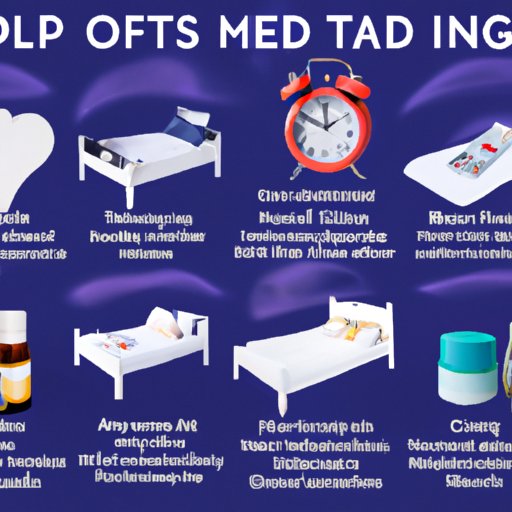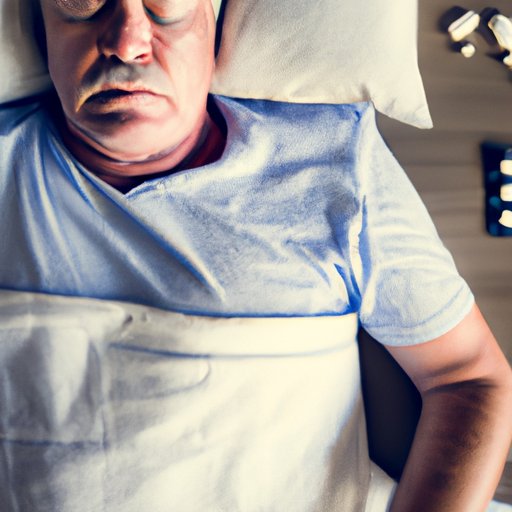Introduction
Getting a good night’s sleep is essential for maintaining overall health and wellness. But for those struggling with insomnia or other sleep issues, it can be difficult to get the restful sleep they need. Fortunately, there are numerous sleep aid products on the market that can help people get the restful sleep they need. But with so many products available, it can be difficult to know which one is best for you. In this article, we’ll explore what sleep aids are, why people use them, and how to choose the best sleep aid for your needs.

Comprehensive Guide to the Best Sleep Aid Products on the Market
Sleep aids come in a variety of forms, from pills to teas, sprays, and more. Different types of sleep aids work differently and have different ingredients, so it’s important to understand the pros and cons of each type before making a selection. Here’s a look at some of the most popular sleep aid products available:
Pills
Pills are the most popular form of sleep aid and come in a variety of formulations. Some contain herbal or natural ingredients, while others contain synthetic compounds. Most over-the-counter (OTC) sleep aids contain antihistamines like diphenhydramine or doxylamine, which can make you drowsy. Prescription sleep medications like Ambien, Sonata, and Lunesta contain stronger compounds and should only be used under the supervision of a doctor.
Teas
Herbal teas are another popular option for those looking for a natural sleep aid. Teas like chamomile, lavender, and valerian root have been used for centuries to help promote relaxation and restful sleep. These teas are generally safe and non-addictive, but it’s still important to talk to a doctor before using them.
Sprays
Sleep sprays are another popular option, particularly for those who don’t want to take pills or drink tea. These sprays usually contain melatonin, an ingredient that helps regulate sleep patterns. Sprays are easy to use and generally considered safe, but it’s important to read the label carefully to make sure the product is right for you.

Overview of Popular Sleep Aid Ingredients and Their Benefits
Most sleep aids contain a combination of active ingredients that help promote relaxation and restful sleep. Here’s a look at some of the most common ingredients found in sleep aids and the benefits they offer:
Melatonin
Melatonin is a hormone produced naturally in the body that helps regulate sleep cycles. It is often used as a supplement to help induce sleep and can be found in both OTC and prescription sleep medications. Melatonin is generally considered safe, but it is important to speak to a doctor before taking it.
Valerian Root
Valerian root is an herbal remedy that has been used for centuries to help promote relaxation and restful sleep. It is available in pill and tea form and is generally considered safe, although it may cause side effects in some people. As with any supplement, it’s important to talk to a doctor before taking it.
Chamomile
Chamomile is a soothing herb that has been used for centuries to help reduce stress and promote relaxation. It is available in both pill and tea form and is generally considered safe, although it may cause side effects in some people. As with any supplement, it’s important to talk to a doctor before taking it.
Identifying the Most Effective Sleep Aid for Your Needs
When selecting a sleep aid, it’s important to consider the factors that will determine which product is most effective for you. Here are some questions to ask when choosing a product:
- What type of sleep aid do I need?
- What ingredients are used in the product?
- Are there any potential side effects?
- Does the product have any drug interactions?
- How long will it take for the product to start working?
- Is the product covered by my insurance?
It’s also important to consider any underlying health conditions or medications you may be taking, as these could interact with the sleep aid and cause unwanted side effects.
Comparing Natural Sleep Remedies to Over-the-Counter Options
Natural remedies like herbs and supplements can be a good option for those looking for a safe and non-addictive way to get a good night’s sleep. However, it’s important to note that natural remedies may not be as effective as OTC sleep aids, and they may take longer to start working. Additionally, it’s important to speak to a doctor before taking any natural remedies, as they may interact with medications or other supplements you’re taking.
Over-the-counter sleep aids can provide quick relief and are generally considered safe when taken as directed. However, these products can become habit-forming if taken for too long, and some may have serious side effects. It’s important to read the label carefully and follow the instructions for use to minimize the risk of side effects.
Uncovering the Secrets of Getting a Good Night’s Sleep
Getting a good night’s sleep isn’t just about taking a sleep aid; there are other steps you can take to improve your sleep quality. Here are some tips for getting a better night’s sleep:
- Establish a regular sleep schedule and stick to it.
- Avoid caffeine, alcohol, and nicotine before bed.
- Exercise regularly and avoid exercising too close to bedtime.
- Create a comfortable sleeping environment, free of distractions.
- Limit screen time before bed.
- If necessary, take a short nap during the day.
For those suffering from chronic insomnia, cognitive behavioral therapy (CBT) can be an effective treatment option. CBT is a type of therapy that focuses on changing thought and behavior patterns that are preventing you from getting a good night’s sleep.

Examining the Impact of Sleep Aids on Overall Health and Wellness
Sleep aids can provide quick relief from insomnia and other sleep issues, but it’s important to be aware of the potential risks associated with these products. Short-term side effects can include dizziness, nausea, headaches, and dry mouth. Long-term use of sleep aids can lead to dependency and tolerance, meaning you’ll need to take higher doses to achieve the same effect. Additionally, some sleep aids may interact with other medications or supplements, so it’s important to speak with a doctor before taking them.
Conclusion
Sleep aids can be an effective way to get a good night’s sleep, but it’s important to understand the various types of sleep aids available and the potential risks associated with them. The best sleep aid for you depends on your individual needs and preferences, so it’s important to do your research and speak with a doctor before taking any product. Additionally, there are other strategies you can use to improve your sleep quality, such as establishing a regular sleep schedule and avoiding caffeine, alcohol, and nicotine before bed. With the right approach, you can get the restful sleep you need to maintain your health and wellbeing.
(Note: Is this article not meeting your expectations? Do you have knowledge or insights to share? Unlock new opportunities and expand your reach by joining our authors team. Click Registration to join us and share your expertise with our readers.)
